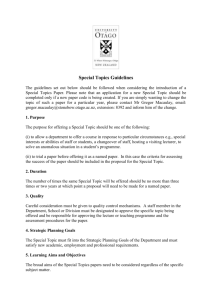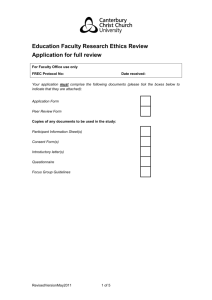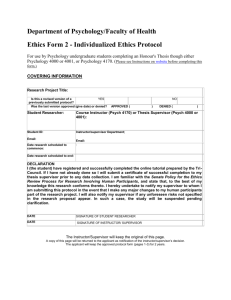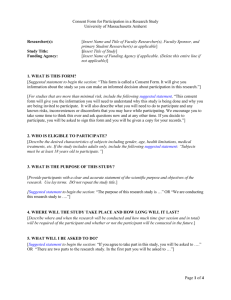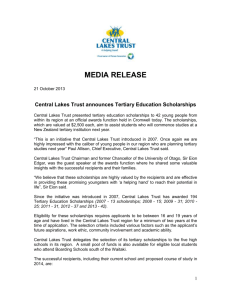Human Ethics Application Guide - University of Otago
advertisement
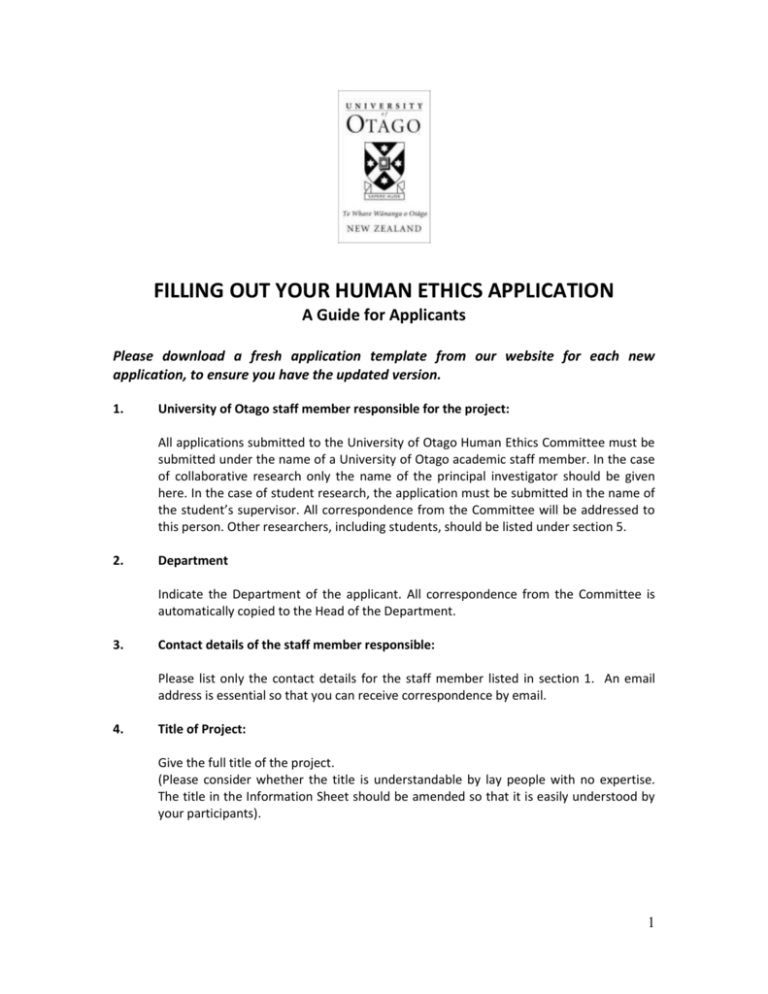
FILLING OUT YOUR HUMAN ETHICS APPLICATION A Guide for Applicants Please download a fresh application template from our website for each new application, to ensure you have the updated version. 1. University of Otago staff member responsible for the project: All applications submitted to the University of Otago Human Ethics Committee must be submitted under the name of a University of Otago academic staff member. In the case of collaborative research only the name of the principal investigator should be given here. In the case of student research, the application must be submitted in the name of the student’s supervisor. All correspondence from the Committee will be addressed to this person. Other researchers, including students, should be listed under section 5. 2. Department Indicate the Department of the applicant. All correspondence from the Committee is automatically copied to the Head of the Department. 3. Contact details of the staff member responsible: Please list only the contact details for the staff member listed in section 1. An email address is essential so that you can receive correspondence by email. 4. Title of Project: Give the full title of the project. (Please consider whether the title is understandable by lay people with no expertise. The title in the Information Sheet should be amended so that it is easily understood by your participants). 1 5. Indicate type of project and the names of other investigators and the students; List all collaborating staff, students, or researchers from outside the University of Otago. After the application is approved, the Committee will need to be informed if there are any amendments to the list e.g. if a student replaces another a year into the study. 6. Is this a repeated class teaching activity? If the application for ethical approval is being made for a teaching activity, rather than research, indicate yes. If this is a repeat application, it is helpful to provide the application reference number for the previous proposal. 7. Fast-track procedure In exceptional and unexpected circumstances, a researcher may request that an application be considered under the fast-track provisions. Please provide a robust justification for Fast-Track Consideration. To apply for Fast-Track please email your completed Fast-Track application following Head of Department approval to Jane Hinkley, Academic Committees Administrator (Extension 6531) e-mail: jane.hinkley@otago.ac.nz and post the original signed application to the Academic Committees Office (we are located on the ground floor of the Clocktower Building). 8. Intended start date of recruitment and data collection: Intended end date of data collection: Research cannot commence until full ethical approval has been given. Give the date at which it is expected that participants will become involved in the project. Many researchers carry out a literature review before starting the recruitment of participants, but the date to be detailed here is the date that recruitment will begin. Also give the date that completion of the project is expected. Note that approval of research projects expires after three years. If the project continues longer than three years, the applicant should contact the Committee with a request for an extension. Please note that retrospective approval cannot be given. 9. Funding of the project: If the project is externally funded, participants will normally be expected to be made aware if any commercial use is made of the data or if the data will be shared by any outside person or organisation. This information should be included on the Information Sheet. If this information will not be shared with potential participants, please explain why. 10. Brief description in lay terms of the purpose of the project 2 Please provide a short description of the purpose of the project using terminology appropriate for non-academic members of the Committee. A more detailed explanation of the research is asked for in Item 11 below. If the Committee cannot understand your proposal, it is unlikely that your intended participants will be able to understand either. 11. Aim and description of project: Please clearly specify the aims. What is the research question the research will attempt to answer, and how? Be sure to cite any references included under this section. Outline the overall implications of the research. What will the researcher and wider community gain from the research? What are the benefits? Note that a more detailed description of the methodology as it pertains to participants should be given in section 13. 12. Researcher or instructor experience and qualifications in this research area Indicate the relevant experience, expertise and qualifications for undertaking the research or for supervising the students undertaking the research. This question is primarily aimed at the staff member listed under question 1, but can include coinvestigators/co-supervisors and the student researcher. 13. Participants Participants means any person whose behaviour, actions, or condition, the researcher proposes to study; or whose personal information the researcher proposes to collect or use. 13. (a) Population from which participants are drawn: Specify what sort of participants you will be seeking. Specify whether participants will be vulnerable, e.g. minors, prisoners, or anyone whose capacity to give informed consent is compromised in any way. If your research proposes to recruit patients/consumers of health and disability services; or proposes to collect the health information of a healthy individual (not recruited as a patient) (e.g. collecting blood, urine, tissue samples, or measuring health information or introducing any health intervention); then your study falls under the University of Otago Human Ethics Committee (Health). Please apply using the Health application form located on our website at: http://www.otago.ac.nz/administration/committees/HumanEthicsCommittees. html . 13. (b) Specify inclusion and exclusion criteria: Specify what type of participant you are seeking. Careful consideration should be given to setting the inclusion criteria (those participants you wish to attract to the project) and the exclusion criteria (those you wish to prohibit from 3 participating), taking into account the purpose of the research and also the safety of the potential participants. The inclusion and exclusion criteria, as listed here, should also be set out on the Information Sheet for Participants, and any other Information Sheets that may be necessary for other interest groups, such as parents/guardians. 13. (c) Estimated number of participants: Specify the range in the number of participants that will be recruited. What is the minimum number of participants required to make the research viable in addressing the research questions? What is the maximum number of participants? Where a sample size calculation is appropriate i.e., for quantitative research, it should be provided. Provide a brief justification for the number of participants. Please note that this information is expected for both quantitative and qualitative research projects. 13. (d) Age range of participants Specify the age of the youngest and oldest participants that will be recruited. Applicants should note the following points if they intend to recruit young people: - The legal definition of a minor is usually 20, but varies according to specific legislation; - That the Children and Young Persons legislation defines a ‘child’ as a person under 14 and a ‘young person’ as a person between the ages of 14 and 16; - That for the purposes of requiring parental consent it might be appropriate to expect such consent to be obtained for participants up to the age of 16 but that, in some circumstances or for some proposals, this requirement might be able to be lowered to 14 years and younger depending on the nature of the research. 13. (e) Method of Recruitment Explain in detail how participants will be contacted and recruited. If advertisements will be used, explain where they will be posted or published. Please attach the advertisement to be used to recruit participants at the end of the application. A template for the development of an advertisement for the recruitment of participants is provided with the application form. Will any other organisation be involved in the recruitment of participants? If so, please include details of how this process will be managed. Please attach any relevant agreements or MOUs with organisations. 13. (f) Please specify any payment or reward to be offered: Specify whether or not a payment will be made to participants. Payments made to participants to cover costs associated with participating in the research, such 4 as compensation for travel, are appropriate. It is considered that payments offered as inducements are not appropriate. Where a koha is to be offered, please be specific about what you are giving to the participants and its value. Please note that care needs to be taken with wording when preparing contracts, advertising material and other documents where research participants will be reimbursed for their participation. The word "remuneration" implies that there is an employment relationship between the study participant and the University. Any mention of hourly rates or time involved with the study also implies that there is an employment relationship between the study participant and the University. This has tax and administrative implications for both the participant (PAYE will need to be deducted from their payment) and the University (the participant will need to fill in personnel forms and be loaded to payroll). The word "reimbursement", however, implies that we are merely reimbursing the participant for expenses incurred, and this payment is tax free. 14. Methods and Procedures Describe the design of the study, and in particular the nature of the tasks required of participants. The various precautionary measures to be taken to avoid harm or discomfort should be described (up to two pages; any questionnaire or survey form, or line of questioning to be used must be attached). Will there be control conditions? Will there be differing levels of participation? If so, please describe. 15. The Privacy Act 1993 and the Health Information Privacy Code 1994 imposes strict requirements concerning the collection, use and disclosure of personal information. The following questions allow the Committee to assess compliance. 15. (a) Are you collecting and storing personal information directly from the individual concerned that could identify the individual? YES / NO 15. (b) Are you collecting information about individuals from another source? Please explain. If information about individuals is being collected from another source, please explain which source, and reasons for this collection method. 15. (c) If you are collecting personal information directly from the individual concerned, specify the steps taken to make participants aware of the following points: You should make participants aware of these points in an Information Sheet for Participants (a suggested template is attached): the fact that you are collecting the information 5 the purpose for which you are collecting the information and the uses you propose to make of it who will receive the information the consequences, if any, of not supplying the information the individual's rights of access to and correction of personal information If you are not informing them of the points above, please explain why. 15. (d) Please outline your data storage and security procedures. The University requires original data of published material to be archived for at least five years after publication for possible future scrutiny. The University is responsible for providing data storage space, data relating to projects should be kept in secure storage within the University Department concerned [rather than at the home of the researcher] unless a case based on special circumstances is submitted and approved by the University of Otago Human Ethics Committee. While the expectation of the Committee is to retain original data for at least 5 years in secure storage, it is also expected that any personal information which generally refers to the information the researcher may hold on the participants such as contact details, audio or video tapes, after they have been transcribed etc, will be destroyed (the data derived from the research will in most cases be kept for much longer or possibly indefinitely). The paramount issue for the researcher is to ensure that the participant is fully aware of exactly what will be done with the data and the personal information prior to consenting to take part in the research. The storage of any sensitive or personal information regarding research participants on storage systems outside of the control of the University of Otago is inappropriate. It is recommended that a University controlled data centre be used for the purpose. Information Technology Services provide such a service and the Committee recommends that you contact Mark Borrie (ITS Security Manager) to discuss your needs. Please provide the Committee with the details of the data storage and access and security arrangements once they have been made. Some more information about cloud computing can be found at: http://www.otago.ac.nz/its/about/publications/otago030292.html 15. (e) Who will have access to personal information, under what conditions, and subject to what safeguards? Personal information includes video and audio recordings, transcripts of interviews etc. Although individuals do not need to be named, the positions of those with access to the data and their relationship to the research need to be listed. 6 Will participants have access to this information? Will participants be given access to the data in its raw format? Will the results of the research be provided or be made available to participants when the project is completed? This should also be made clear to participants before they consent to the project. 15. (f) Do you intend to publish any personal information and in what form do you intend to do this? Explain the format the data will take in the final write up. If participants are to be identified, the Information Sheet and/or Consent Form should reflect this. 15. (g) Do you propose to collect demographic information to describe your sample? For example: gender, age, ethnicity, education level, etc. The Committee recommends that you use the question format used in the Census for collecting ethnicity data. The following link discusses the ethnicity question; http://www.stats.govt.nz/Census/2013-census/info-about-2013census-data/information-by-variable/ethnicity.aspx The question allows a range of options and ends in other to allow participants to self-identify. The question looks like this: 15. (h) Have you, or do you propose to undertake Māori consultation? If not, please provide a brief outline of reasons why not. We would refer you to the University of Otago Research Consultation with Maori Policy (found on http://www.otago.ac.nz/research/maoriconsultation ). Under the Purpose of the Policy it states those areas of research affected and expectations of timing and submission dates. You can attach a copy of any automated response acknowledging receipt. If this process has already been 7 undertaken please attach a copy of the letter you will have received from the Ngāi Tahu Research Consultation Committee. 16. Does the research or teaching project involve any form of deception? Where participants have not been informed fully of the nature and purpose of the research, or where in the course of the project some degree of deception is involved, the researcher must provide participants with an explanation of the research goals and procedures when the procedure is completed. Researchers also have an obligation to be available after participants have participated in the project, should any stress, harm, or related concerns arise. Participants should normally have the opportunity to obtain information relating to the outcome of the project if they wish. Where relevant, explain how these matters will be dealt with in the proposed research. 17. Please disclose and discuss any potential problems The applicant should discuss potential issues or concerns that might arise as a result of the research and strategies for avoiding or mitigating potential problems. Such issues may include, but not be restricted to the following: Physical harm, discomfort or inconvenience to participants; Mental or emotional distress or anxiety prompted by the research; Legal complications (examples may include the disclosure of illegal activity by participants to researchers) Community or media concerns with the research (e.g., topic might strain community relations, touch upon sensitive issues, or attract media attention); Conflict of interest (examples may include situations where the researcher may have an additional role to that of a researcher, i.e., an employee of an organisation being studied, using participants that are also students (and thus) will be marked by the researcher); Threats to anonymity (e.g., the population sample might be small and therefore difficult to maintain participants’ anonymity); Potential risk to researcher (examples include research involving potentially violent participants, students undertaking interviews alone or in an unsafe setting, sensitive or emotionally distressing issues, student researchers travelling overseas). Ethical approval does not override the University of Otago’s Travel Policy and Fieldwork Policy. These policies must be reviewed and complied with. The Committee will expect a risk assessment for any overseas travel. Has the University’s Travel Insurer provided cover? Please refer to Appendix B – Students Conducting Research Overseas. If research is to be conducted anywhere in the Pacific region, the Committee seeks assurance that the researcher has read and considered the Pacific Research Protocols regarding the research. All University of Otago staff and students need to comply with the principles set out in the Protocols, which can be found at the following website: http://www.otago.ac.nz/research/otago028670.html 8 If the research is being carried out by a student researcher, the supervisor has the responsibility of ensuring the student is aware of the Protocols and complies with them. Please provide the Committee with confirmation as to whether or not a research permit is required to conduct research in the relevant Pacific location, and if so, please provide the Committee with evidence that a permit has been obtained. Researchers also have an obligation to be available after participants have participated in the project, should any stress, harm, or related concerns arise. If it is anticipated that professional services are appropriate, these services for the participants should be clarified. Participants should also be made aware of risks, limitations and obligations inherent in the research. Participants normally should have the opportunity to obtain information relating to the outcome of the project if they wish. 18. Applicant’s signature Please ensure that the person signing the application is the applicant (the staff member responsible for the research as listed in section 1) rather than the student researcher. The applicant should sign off their application prior to submitting it to their HOD. 19. Departmental approval The Head of Department’s signature on the application is confirmation that the research project is valid and ethically sound. The signature is an endorsement of the methodology the research employs. If the person responsible for the project is the HoD then it is inappropriate for them to sign here as HoD. Ideally the appropriate Dean or Pro-Vice-Chancellor should sign instead,. Alternatively a senior member of the academic staff from the department who is knowledgeable in the subject area or is familiar with the research methodology can sign off. Please get the original signed before copying the application for the Committee. Each Committee member needs to have a fully signed off copy. Please note that the Committee expects to review the finalised documentation that will be provided to participants, as opposed to a draft; therefore writing style, spelling and formatting should be of the highest standards and should be free of any errors or ambiguity. If the application is for student research, it is the responsibility of the supervisor to proofread and correct documentation that will be distributed to research participants. 9 APPENDICES TO THE APPLICATION Please attach the Information Sheet, the Consent Form and the Advertisement to Recruit Participants to this application. The Information Sheet and Consent Form must be separate documents, as the participant keeps the Information Sheet but returns the Consent Form. Information Sheet Consider whether a simplified title is required for your participants. At a minimum the Information Sheet must describe (using wording and terms that ordinary people can comprehend): the nature and purpose of the research the procedure and how long it will take any risk or discomfort involved who will have access and under what conditions to any personal information the eventual disposal of data collected the name and contact details of the staff member responsible for the project and an invitation to contact that person over any matter associated with the project details of reimbursement offered for participation and compensation payable in the event of harm exclusion criteria for the project, if applicable,. (If exclusion include a clear statement to the effect that: “People who meet one or more of the exclusion criteria set out above may not participate in this project, because it involves unacceptable risk to them.”) and any other relevant matters. The Information Sheet must conclude with the statement: “This study has been approved by the University of Otago Human Ethics Committee. If you have any concerns about the ethical conduct of the research you may contact the Committee through the Human Ethics Committee Administrator (ph +643 479 8256 or gary.witte@otago.ac.nz). Any issues you raise will be treated in confidence and investigated and you will be informed of the outcome.” Consent Form The Consent Form must make it clear that a participant: understands the nature of the proposal; has had all questions satisfactorily answered; is aware of what will become of the data (including video or audio tapes and data held electronically) at the conclusion of the project; knows that he or she is free to withdraw from the project at any time without disadvantage; is aware of risks, remuneration and compensation; is aware that the data may be published; is aware that a third party (i.e. transcriber) may have access to the data; is aware that every effort will be made to preserve the anonymity of the participant unless the participant gives an express waiver, which must be in addition to and separate from this consent form. 10 Research or teaching involving children or young persons may require written consent from both the child or young person AND the parent/guardian unless an adequate justification is provided. Ensure that the parent/guardian’s consent form is linked to the child, as surnames may differ. Advertisement for Recruitment of Participants The Advertisements should include the following: description of the project; criteria for eligibility; benefits to participants (if any); time commitment for participants. Applicants should use the pro forma Information Sheet and Consent Form provided by the University of Otago Human Ethics Committee, with appropriate adaptation, unless a case is made and approved that these formats would be inappropriate for the specific project. Refer to Appendix A: Common Problems with the Information Sheet and/or Consent Form 11 Appendix A: Common Problems with the Information Sheet and/or Consent Form raised by the Committee The Committee expects to see the finalised versions that will be given to Participants under the University’s name. When they review your documentation, they will pick up any errors and note them, as they want to assist researchers to provide the best possible information to participants. The following are common issues that arise: The need to reword text into lay terms for participants (being user-friendly), and tailoring the information sheet and consent form appropriately for children and young people. More information being required under the Aims section, including noting the implications of the research and its benefits. The need to include the Human Ethics Committee contact statement. The Writing style, spelling and formatting should be of the highest standards and should be free of any errors or ambiguity. If the application is for student research, it is the responsibility of the supervisor to proofread and correct documentation that will be distributed to research participants. Numbering errors in the Consent Form. The use of personal pronouns in the Consent Form (ie the Consent Form needs to be worded from the participant’s point of view). Neglecting to provide advice about the time commitment involved in the project. Neglecting to provide details around what clothing may need to be worn, and what participants will experience. Checking that anonymity options are available, and ensuring the Information Sheet and Consent Form relate to each other regarding anonymity. 12 Appendix B – Students Conducting Research Overseas University of Otago staff conducting or supervising research involving human participants in a country other than New Zealand should be aware of the ethical issues that this type of research entails. Every effort should be made to identify and mitigate any potential risk to participants and to the researcher(s). Ethical approval does not override the University of Otago’s Fieldwork Policy and Travel Policy. Such policies should be reviewed and complied with. Safeguarding Participants The University of Otago Human Ethics Committee asks you to be aware of the issues set out below and to address any appropriate issues in the application for ethical approval. If research is being conducted in a country where there might be a relative lack of educational or health infrastructure or where relatively weak socio-economic conditions exist, the participants would normally be considered vulnerable. In these circumstances care should be taken to apply the same ethical standards in the host country as would be expected in New Zealand. Care should also be taken to apply the universally accepted fundamental ethical principles and to be aware that the application of those principles might not be as straight forward as it would be if the research were being conducted in New Zealand. In an application for ethical approval for research being undertaken overseas, the researcher, or research supervisor, must demonstrate that attention has been paid to the political, cultural, social, linguistic and other relevant contextual issues. Researchers and supervisors should be mindful that the research must comply with any requirements of the host country. This may involve local ethical review or Governmental approval. Confirmation of such approval should be included in the application to the University of Otago Human Ethics Committee (UOHEC) if it has been obtained. If it has not, the intention to do so should be explicitly stated in the application. In these cases the UOHEC would normally conditionally approve the application subject to the research being approved in the host country. If there is an absence of any ethical review mechanism in the host country, an effort should be made to solicit the support of a local “sponsor” of the research. Such a sponsor might vary depending on the local circumstances but might be an academic from a university in the country or a community leader. Information Will the participants be fully informed of not only the aims of the research but also of exactly what they will be asked to do, how long it will take and what will happen to the data once it has been gathered. They should be informed of all the information in a format that is appropriate to them i.e., it should be free of jargon, if the information is written, it should be in the language of the participants. 13 Informed Consent Once participants are fully informed, written consent is normally the universal standard. Having said this, there may be cases where less formalized consent may be appropriate. You should be aware of appropriate adaptations of the mechanisms of consent. For example, it might be appropriate to get consent from community leaders or from spouses. Scientific validity Ethical research requires methodology that results in valid data. Participants should not be expected to give up their time if the results of the research are not fruitful. Risks and Benefits The potential benefits of the research should outweigh any risks to participants. Does the research potentially benefit the population from which the participants have been drawn? Ideally, it should. Supervision of students Care needs to be taken in supervising students conducting research overseas. While it is acknowledged that research students are adults and have responsibility for their own safety, the UOHEC wishes to ensure that the University, through the research supervisor, has taken due care in the oversight of their students. Travelling overseas, away from the oversight and guidance of a supervisor, carries some vulnerability to risks for the student. In an effort to minimise that risk, the Committee asks that both students and supervisors are familiar with and comply with the guidelines set out below. Course Related Student Travel Overseas 1. Departments and Supervisors, together with their students, are asked to assess the level of risk associated with students conducting research overseas. Determination of the level of risk should include an assessment of the following factors: (a) Method of travel – any risk associated with the means of travel to and from the destination. (b) Risks associated with the travel destination – including remoteness, climate, geopolitical climate and potential civil unrest, disease and access to health care and communication. Travel destination risk is assessed by International SOS (ISOS) which is a security and medical alert advisory service available to University of Otago staff members. (c) Risks associated with course-related activity – this includes research activity. Students may not be automatically covered by University Liability Insurance Cover and accordingly risks which create any potential liability for the University must be clearly identified and steps taken to mitigate the risks. (d) Fitness for travel – conditions that may affect the ability of the student to travel should be addressed. Particular attention should be paid to the need for all appropriate vaccinations. 14 2. Departments, supervisors and students must ensure that risks have been identified and minimised as appropriate before travel commences and must be able to demonstrate the precautions that have been undertaken. Procedures for Course Related Student Travel Overseas Determine the ISOS risk rating of the country or countries the student is travelling to, i.e. low, medium, high or extreme. Refer to: http://www.internationalsos.com/private/UOtago_MS number: 25ACPA000012. Membership For travel to high risk countries an application should be made by the department to the relevant Pro-Vice-Chancellor (PVC). The application should include the security advice recommended by ISOS together with an explanation of how those risks will be mitigated. Such factors as the student’s familiarity of the country being visited should be taken into account. Travel to high risk destinations must be approved by the relevant PVC. Travel will not be approved by the UOHEC to countries identified as being extreme risk. Research undertaken overseas involving human participants must have ethical approval from the appropriate ethics committee. Information/documentation/contact details The department must ensure that the student has a valid passport, necessary visas and any other relevant travel documentation (be aware that it is the requirement of some governments that a passport needs to have at least 6 months’ validity remaining after the date of intended departure from the country being visited). The department should hold a copy of a detailed travel itinerary of the student. The itinerary should include flight details (airline, arrival/departure dates and times), dates and contact details of accommodation. It should also include names and contact details of any relevant embassy, consulate, sponsor, organisation, institution, family or friend that can be contacted in the case of an emergency. The student must hold contact details (phone, text, email) of the department and supervisor, including after hours contact details in case of an emergency. Medical Preparation The department, supervisor and student should assess the medical risks associated with visiting the country by ISOS. Student Health Services provides travel clinics which are open to all students who attend Otago University. An appointment at the travel clinic needs to be booked as soon as the student is aware of their travel destination as some vaccinations courses take several weeks to complete. Please refer to the Student Health website for detailed information and costs. www.otago.ac/nz/studenthealth 15 Insurance All students travelling overseas on University study / business should arrange travel insurance which will cover their course-related activities Please note: Students are covered by the Professional Indemnity Policy when under the direction or control of the University; and when employed by, or placed with third parties where such employment or placement is in connection with their studies). 16

